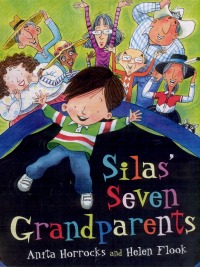| ________________
CM . . . . Volume XVI Number 29. . . .April 2, 2010. 
 |
Silas’ Seven Grandparents.
Anita Horrocks. Illustrated by Helen Flook.
Victoria, BC: Orca, 2010.
32 pp., hardcover, $19.95.
ISBN 978-1-55143-561-9.
Grades 1-4 / Ages 6-9.
Review by Leanne Ryrie and Gregory Bryan.
**½/4
Reviewed from Advance Reading Copy.
|
| |
|

excerpt:
Silas’ seven grandparents gave him presents on his birthday. Six grandparents baked birthday cakes, and one bought an ice-cream cake.
But sometimes Silas couldn’t eat all his cake. “After all, I only have one stomach!” said Silas.
In Anita Horrocks and Helen Flook’s new book, they tell a tale of a young boy with seven grandparents. Presumably the seven grandparents are a result of blended families. Most of the time, Silas enjoys having so many grandparents, but, on occasion, he feels there is not enough of him to go around. Silas is inundated with birthday cakes on his birthday, and he has four different activities planned for the July long weekend. He has seven grandparents taking care of him when he is sick. At times, he feels torn in many different directions.
 The problem presented in Silas’ Seven Grandparents is that Silas’ mom and dad are going away on a business trip. Silas needs to decide with whom he will stay as all seven grandparents have extended an invitation and detailed plans for his stay. “‘I can’t stay with all grandparents at the same time!’ said Silas.” The problem presented in Silas’ Seven Grandparents is that Silas’ mom and dad are going away on a business trip. Silas needs to decide with whom he will stay as all seven grandparents have extended an invitation and detailed plans for his stay. “‘I can’t stay with all grandparents at the same time!’ said Silas.”
Silas comes up with a creative solution to his dilemma, and the story concludes in a manner that is satisfying to all.
Horrocks’ text is patterned and creates a common thread that moves throughout the text. In an effort to portray the situation in a positive light, the author occasionally went too far. For instance, when Silas is faced with the problem of trying to solve his problem, “moonbeams twinkled,” and “glimmers of light tumbled all over his quilt.” What’s more, he was “wrapped in a glittering hug from his head to his toes.” To be fair, this hyperbolic language is not pervasive in the text, and most of the text flows nicely. The word choices reflect diversity of culture as the grandparents are called Nana, Gramma, Papa, Opa, Oma, Granny and Grandad. Flook's illustrations complement the theme of diversity with ethnically diverse portrayals of the aforementioned grandparents.
The art work is busy, reflecting Silas’ busy life. The energy and activity in the art work mirror his frenetic state. This is further illustrated through the motion conveyed in the illustrations. Flook worked with mixed media, including water colours and acrylics, to create colourful illustrations.
The problematic scene with the twinkling moonbeams is not confined to the text as the pictures also include contrived personification with the inclusion of a face on the moon. This whole episode seems incompatible with the overall feel of the book, which is one of contemporary realism. We would have much preferred a firmer editorial hand that saw the elimination of this departure from the established tone of the book.
In our preparing to review the book, the story was shared with a class of grade 2 students. It was enthusiastically received, and the students particularly enjoyed the portrayal of a less-traditional family. Many of the students could see elements of their own family structures reflected in the book. They recognized the repeated element of the text and, in unison, said aloud these recognizable portions of text.
Silas’ Seven Grandparents fills a much-needed niche in that it addresses the fact that all families look different. It is also a celebration of these differences.
Recommended.
Leanne Ryrie teaches second grade in Winnipeg, MB, and is currently a graduate student in the Faculty of Education, the University of Manitoba.

To comment on this title or this review, send mail to
cm@umanitoba.ca.
Copyright © the Manitoba Library Association. Reproduction for personal use is permitted only if this copyright notice is maintained. Any other reproduction is prohibited without permission.
NEXT REVIEW |
TABLE OF CONTENTS FOR THIS ISSUE- April 2, 2010.
AUTHORS |
TITLES |
MEDIA REVIEWS |
PROFILES |
BACK ISSUES |
SEARCH |
CMARCHIVE |
HOME |

 The problem presented in Silas’ Seven Grandparents is that Silas’ mom and dad are going away on a business trip. Silas needs to decide with whom he will stay as all seven grandparents have extended an invitation and detailed plans for his stay. “‘I can’t stay with all grandparents at the same time!’ said Silas.”
The problem presented in Silas’ Seven Grandparents is that Silas’ mom and dad are going away on a business trip. Silas needs to decide with whom he will stay as all seven grandparents have extended an invitation and detailed plans for his stay. “‘I can’t stay with all grandparents at the same time!’ said Silas.”